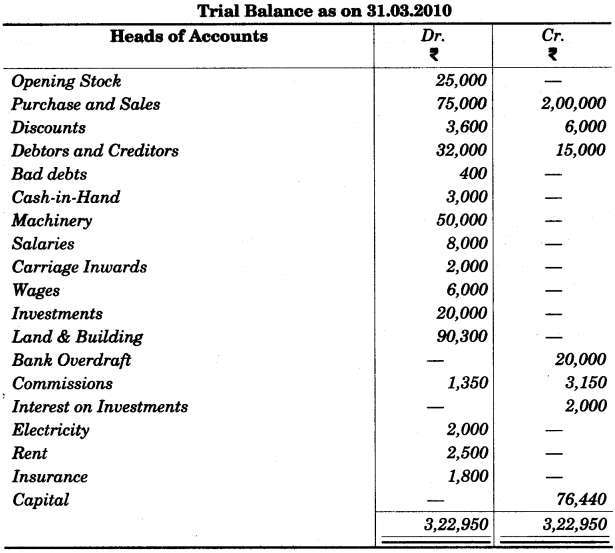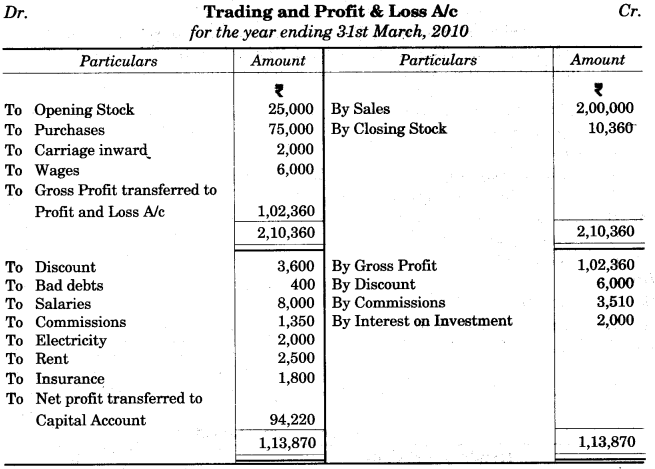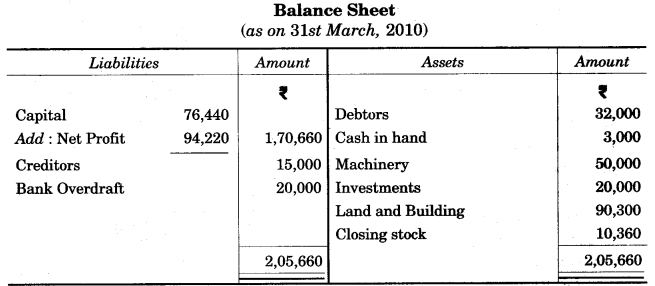ICSE Commercial Studies Previous Year Question Paper 2012 Solved for Class 10
ICSE Paper 2012
COMMERCIAL STUDIES
(Two Hours)
Answers to this Paper must be written on the paper provided separately.
You will not be allowed to write during the first 15 minutes.
This time is to be spent in reading the Question Paper.
The time given at the head of this Paper is the time allowed for writing the answers.
Attempt all questions from Section A and any four questions from Section B.
The intended marks for questions or parts of questions are given in brackets [ ].
Section-A (40 Marks)
(Attempt all questions from this Section)
Question 1:
Distinguish between:
(a) Stakeholders and Shareholders. [2]
(b) Verbal Communication and Non-verbal Communication. [2]
(c) Internal Recruitment and External Recruitment. [2]
(d) Packing and Packaging. [2]
(e) Public Warehouses and Bonded Warehouses. [2]
Answer:
(a)
| Stakeholders | Shareholders |
| Individuals or groups which are affected by the decision of an organisation, are known as stakeholders. | Persons and groups who have the shares of the company are known as shareholders. |
(c)
| Internal Recruitment | External Recruitment |
| 1. The process of internal recruitment is less expensive as it does not involve expenses in the form of advertising for vacancies etc. | The process of external recruitment is more expensive as it involves considerable expenses in the form of advertisement for vacancies etc. |
| 2. The management has a limited choice in choosing the most suitable candidates for the vacancies. | The management has a wide choice in choosing the most suitable candidates for the vacancies. |
| 3. It is less time consuming. | It is more time consuming. |
(d)
| Packing | Packaging |
| 1. Packing of goods implies placing them in suitable packets to facilitate their easy and safe handling, to ensure their quantity and quality, to protect them from any kind of damage. | Pacaking facilitates advertising. It lends individuality or identification to the products. It can be used to educate the consumers by telling them about the different uses of the product or the different methods of use. |
| 2. Packing is also used for providing additional information to the consumers about the products such as contents, price, the date of manufacture, date of expiry, brand name, etc. | Packaging must be convenient, attractive, protective and economical. Besides being an ancillary service to the trading activity, packaging is fast developing in a very profitable independent industry. |
(e)
| Public Warehouses | Bonded Warehouses |
| 1. The warehouses which are run to store goods of the general public are known as public ware-houses. | These warehouses are used to store imported goods for which import duty is yet to be paid. |
| 2. An individual, a partnership firm or a company may own these warehouses. | These are generally owned by dock authorities and found near the ports. |
Question 2.
(a) What is meant by Deferred Revenue Expenditure? [2]
(b) State any two expectations of suppliers from a business organisation. [2]
(c) What do you understand by Formal Communication. [2]
(d) Mention the Interpersonal Skills required for effective communication. [2]
(e) What do you mean by Sale on approval or Return? [2]
Answer:
(a) Refer Ans. 4. (d), 2016.
(b) Expectations of suppliers from the organisation are as given below:
- Suppliers expect that the organisation is going to make purchases from them on reasonable terms and not to exploit them.
- Suppliers expect that reasonable time should be given to them by the organisation for the supply of goods as the processing and packing of order consumes time before they: aye delivered to the buyer.
(d) The main interpersonal skills required for effective communication are:
- Speaking skill: Ability to speak well is a valuable skill. The following guidelines can help to become a good speaker (a) know your subject, (b) know your audience, (c) Adopt right posture (d) Use humour.
- Listening skills: Listening with complete attention and expathy is essential for success in communication. It requires: (a) Positive attitude (b) Concentration, (c) Patience.
(e) Sale on approval: Under this method, goods are actually sent to the prospective buyer for inspection and approval. If the buyer is satisfied with the quality of the goods, he approves the goods and it becomes a contract of sale.
Question 3:
(a) Mention any two points of difference between Advertising and Publicity. [2]
(b) Give two points of difference between Fixed Cost and Variable Cost. [2]
(c) Why is a Master Budget also known as a Summary Budget? [2]
(d) What is Banking? [2]
(e) Selection is a negative process. Explain. [2]
Answer:
(a) Refer Ans. 1. (a), 2015.
(c) Master budget: Master budget is a consolidated summary of various functional budgets. According to CIMA London, a master budget is, “the summary budget incorporating its components functional budgets and which is finally approved, adopted and employed.”
(d) According to Banking Regulation Act of India 1949, Banking means the accepting for the purpose of lending or investment of deposits of money from the public repayable on demand and withdrawal by cheque, draft, order.
(e) Selection is said to be a negative process because the number of candidates rejected is much higher than that of the selected persons. It is an elimination process.
Question 4:
(a) Mention two methods of Off-the-Job Training. [2]
(b) What is meant by Industrial Disputes? [2]
(c) State two disadvantages of Water Transport. [2]
(d) Mention any two documents used in Warehousing. [2]
(e) Why do we need The Consumer Protection Act 1986? [2]
Answer:
(a) Two methods of off -the-job Training:
- Under off-the-job training method, the employee learns outside the work place through lectures, workshop and other ways.
- Off-the-job training teaches both the theoretical and practical aspects of the job.
(b) Industrial dispute is any dispute or difference between the employees and employers or between employees and employees, which is concerned with the employment or the terms of employment or with the conditions of work of any person. Such disputes result in strikes, gheraos and lock-outs etc.
(c) Two disadvantages of water transport:
- Water transport is very slow.
- Water transport is not suitable for carring perishable goods as its speed is low.
(d) Two documents used in warehousing are:
- Warehouse Warrant: When goods are stored in a public bonded warehouse, the warehouse keeper issues a warrant in favour of the owner of the goods. It is a document certifying that the specified goods have been deposited in the warehouse for safe keeping.
- Warehouse keeper’s receipt: This is a receipt of the acknowledgement of the goods by the warehouse keeper. It serves as a proof of storing the specified goods in the warehouse.
(e) Consumer Protection Act was passed:
- To protect the interest of the consumers.
- To promote and protect the right of the consumers.
- To encourage fair trade practices.
- To make it obligatory on the seller to supply the right products at reasonable price to the public.
Section – B (40 Marks)
(Answer any four questions from this section)
Question 5:
(a) Distinguish between a Cheque and a Demand Draft. [5]
(b) Describe any two objectives of Brand Promotion. [5]
Answer:
(a)
| Cheque | Demand Draft |
| 1. Cheque is drawn by a person. | Draft is drawn by a bank. |
| 2. It is dishonoured in case of inadequate funds in the bank account of the drawer. | The draft amount is taken in advance by the bank. Therefore, the question of its dishonour does not arise. |
| 3. A cheque can be drawn payable to bearer. | A draft cannot be made payable to bearer. |
| 4. In case of a cheque the person who receives the payment has to pay collection charges. | In case of a draft commission is paid in advance by the sender of money. |
| 5. The payment of a cheque can be stopped by giving a written notice to the concerned bank. | The payment of a bank draft cannot be so easily stopped. |
(b) Two objectives of Brand Promotion:
- Providing Information: A large part of a company’s brand promotional efforts has always been directed at providing proper and complete information to the customers about its various brands offered in the market. Brand promotion information contains the following things: new products launched; how they work; existing products; prices; selling centres; hours of sale; special schemes or offers such as percent off, discount, free-gifts, more guarantee period; and so forth.
- Increasing Demand: Most brand promotions aim at stimulating demand for a product. They persuade customers to buy and to buy more and more, so that it results in large sales, thereby large market share and eventually huge profits.
Question 6:
(a) Explain any two methods of conducting ‘Marketing Research’. [5]
(b) Give any five reasons why people consider advertising a Social waste. [5]
Answer:
(a) Refer Ans. 6. (b), 2016.
(b) Advertising has been criticised on the following grounds:
- Higher Prices: Advertising increases prices of products to consumers because the expenses incurred on advertisements are passed on to consumers. However, advertising will not increase prices if it leads to large scale production.
- Creation of Monopoly: Big firms spend huge amounts of money on advertising. Small firms cannot compete with them and ultimately fail. As a result, big firms become monopolies and use their monopoly power to exploit consumers.
- Wastage of Resources: Money spent on advertising is sheer waste because it does not add to the utility of products and services. Most of the advertisements are either ignored or escape the attention of consumers. Advertisements do not create new demand but only shift demand from one product to another.
- Deceptive and Untruthful: In order to impress upon the people, false statements and exaggerated claims are made in advertisements. As a result, innocent people are misled to buy inferior and even worthless products. Advertising offers scope for fraud and deception.
- Extravagance: Advertising tempts people to buy goods which they cannot afford. They become extravagant and do not hesitate even to adopt corrupt practices to earn more. This creates frustration and corruption in society. People become greedy and self-centered, causing unrest and jealousy.
Question 7:
(a) Explain the term Social Security.
Explain any two Social Security measures adopted in India. [5]
(b) Explain any two types of employment tests which are conducted to select employees for an enterprise. [5]
Answer:
(a) Social security: In the words of International Labour Organisation, ‘Social Security is that security that society furnishes through appropriate organisation against certain risks to which its members are exposed.’
According to I.L.O. “Social Security” is the protection which society provides for its members through a series of public measures against the economic and social distress that otherwise would be caused by the stoppage Or substantial reduction of earnings resulting from sickness, materity, employment, injury, unemployment, invalidity, old age and death, the provision of subsidies for family with children”.
The two social security measures adopted in India are:
- Provident Fund Scheme: Under the Employees Provident Fund and Miscellaneous provisions Act, the Central Government has established the provident fund scheme for employees. Every employee is entitled to become member of the scheme after completing three months of continuous service. Both employer and employee contribute ten percent of the basic wages. The accumulated amount of savings is payable on retirement, death or at the time of leaving service. An employee can also withdraw this amount for construction of house or various other purposes.
- Pension: Under the Employees Provident Funds and Miscellaneous provision act, the Government of India has framed family pension scheme to provide family pension benefits to employees. The scheme was launched with the objective of providing long term recurring financial assistance to the employee after retirement and to his family and in case of premature death while in service.
(b) Tests: Tests have become a popular technique of selecting employees. A test is a systematic comparison of the work behaviour of candidates on sample basis. Selection tests assess the attitude and performance of candidates with the help of psychological techniques.
Two types of tests are:
- Achievement Tests: This test measures the skills and knowledge which the candidate already possesses at the time of testing. These tests help to determine whether the claims made by the candidate about his knowledge and skills are correct or not. The candidate is asked to perform the job and his actual test performance indicates his proficiency. For example, a candidate for the post of typist may be asked to type a page so as to judge his speed and accuracy.
- Intelligence Tests: These tests measure a person’s capacity for listening and comprehension in terms of his vocabulary, mental alertness, memory, reasoning, etc. An applicant’s intelligent quotient (IQ) can be judged through intelligent tests.
As these test are helpful in judging the suitability of a candidate for the job in terms of his intelligence, temperament and dexterity, that’s why tests are used as a method for selection of employees by an organisation.
Question 8:
(a) Mention any five differences between a Commercial bank and the Central bank of a country. [5]
(b) Briefly explain any five factors’ a businessman should keep in mind while selecting a suitable mode of transport. [5]
Answer:
(a)
| Basis of Distinction | Central Bank | Commercial Bank |
| 1. Position | It is the apex institution of a country’s banking system. | It is one of the banks in a country. |
| 2. Ownership | It is owned by the Government. | It is generally owned by the shareholders. |
| 3. Aim | Its aim is to serve the country’s interest. | Its aim is to earn profit. |
| 4. Number | There is only one central bank in a country. | There are several commercial banks in a country. |
| 5. Main client | It is a banker to the Government. | It is banker to the general public. |
(b) Factors that businessman should keep in mind while selecting a suitable mode of transport are:
- Cost of Service: Railways are a cheaper mode of transport for carrying heavy goods over long distances. However for small consignments over short distances motor transport would be cheaper. Air transport is the costliest.
- Speed of Transport: Motor transport is faster than railways for short distances. However, railways are faster than motor transport over long distances because they operate on an exclusive track without much hindrances.
- Flexibility of Service: Motor transport is the most flexible mode in comparison to rail, water and air transport.
- Regularity of Service: Railways provide the most dependable and regular service. They follow a fixed time schedule and are not affected much by weather. On the other hand motor transport and ocean transport are affected by rain, snow etc.
- Safety: Roadways and airways provide better safety and security to goods than waterways and railways.
Question 9:
(a) A well-trained employee is an asset to the enterprise.
Mention any five advantages of training. [5]
(b) Explain the following principles of an Insurance contract:
(i) Utmost good faith. (ii) Subrogation. [5]
Answer:
(a) Refer Ans. 8. (b), 2016.
(b) Refer Ans. 9. (a) (ii), 2016.
Question 10:
Prepare Trading, Profit and Loss A/c and Balance Sheet of M/s Banerjee Enterprises for the year ended 31st March, 2010 from the following Trial Balance. [10]

Answer:


